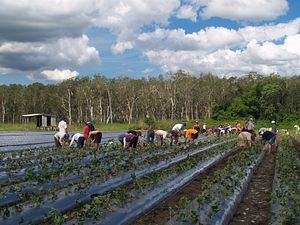Four Corners, a current affairs show on Australia’s public broadcaster ABC, ran a segment earlier this month revealing widespread exploitation of Australia’s migrant workers. The pressure is now on the Australian government to investigate the alleged abuses of the Working Holiday visa. The visa was originally intended to encourage cultural exchange, and permits travelers from eligible countries aged between 18 and 30 to remain in Australia for up to a year on working holiday. According to Four Corners, however, many of the visa holders who arrive in Australia find themselves in “slave-like” conditions.
The Working Holiday visa allows the holder to work for up to six months in one location. Much of the demand for such workers is for low-skilled labor: farm work such as fruit and vegetable picking, or working in poultry factories in remote areas. The visa is supposed to run for one year but “second year extensions” are allowed provided the visa holder does manual labor work in specified areas for a duration of 88 days. According to the Four Corners, exploitation of visa holders includes harassment and assault, while female workers are subject to sexual harassment. Four Corners has also found that workers are collectively cheated out of hundreds of millions of dollars in pay each year.
However, Australian farmers themselves are rarely the sole culprit. They usually source their workers through agents, who act as middlemen, and the problems tend to occur with the cheaper agents. Still, the farmers could face liability if they have entered into an agreement with an agent that involves illegal arrangements.
The exploitation is allegedly so widespread that the ABC has found that those agents who do play by the rules suffer, since supermarkets and fast food chains prefer to use cheaper suppliers. Australia’s supermarkets and food chains are now facing calls to reexamine their supplier relationships and to stop shifting responsibility onto the agents.
According to The National Union of Workers, most of the produce that Australian consumers find in stores has at one point passed through the hands of exploited migrant workers. The problem is not straightforward, involving issues of both immigration and labor rights. One possible solution that has been raised by Dr. Joanna Howe from the University of Adelaide Law School, is to consider a new “low-skilled work visa,” which would expose industry to government regulation. With around 150,000 working holiday visa holders in Australia, some action will need to be taken to avoid tarnishing the country’s reputation.

































